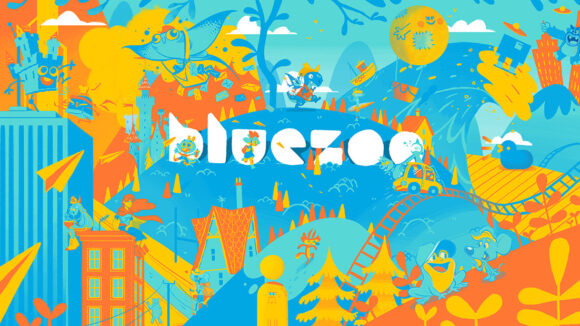

‘Things Will Never Be The Same Again’: Why Blue Zoo Will Let Staff Keep Working Remotely
Last spring, as the coronavirus tore through society, we spoke to people across the animation industry about how they were adapting to the crisis. Close to a year on, with companies well-adjusted to remote work and vaccines pointing to a way out of the pandemic, thoughts are turning to the long-term future.
Covid’s wrenching effect on cities has been well documented: with industries shuttered and commutes eliminated, many have moved out, whether temporarily or permanently. London, a teeming global metropolis, has been especially hard-hit. Media recently reported an estimate by economists that the city’s population has plunged by as much as 700,000 in the last year.
This number caught the eye of Tom Box, co-founder of Blue Zoo — one of the U.K.’s largest independent animation studios (series it has produced include The Adventures of Paddington, It’s Pony, and Numberblocks). On Twitter, Box commented: “Can believe this [estimate], Blue Zoo is no longer really a London based company, even though we have (empty) offices there. Now just 30% of our team live in London. Over last 10 months lots of staff relocated across the UK for a better work/life balance. London has changed forever.”
Can believe this, @blue_zoo is no longer really a London based company, even though we have (empty) offices there. Now just 30% of our team live in London. Over last 10 months lots of staff relocated across the UK for a better work/life balance. London has changed forever. https://t.co/c7FMxmqguB
— Tom Box (@mrtombox) February 5, 2021
Over Zoom, that great emblem of our new normal, Box tells me that Blue Zoo (like many animation companies) has thrived in the pandemic. Its workforce has roughly doubled to 400 in the past year. The shift to remote work has facilitated that growth: those 400 people could never fit in the company’s two studios in Fitzrovia, central London.

In fact, Blue Zoo was already looking to expand outside the capital before Covid. “When we did our staff surveys,” says Box, “most complaints were about the cost of living in London. We’d love to pay our staff more, but our budgets are set by our clients … So we looked at other ways to [address those complaints].” The company aims to open a new studio in Bristol this year, assuming restrictions lift sufficiently to make this feasible.
In the meantime, management has taken the pandemic as an opportunity to reimagine its set-up. Living costs aside, Blue Zoo staff, like so many, have found that remote work has its upsides — Box himself, who lives in the London suburb of Twickenham, has welcomed the increased family time. In a recent survey conducted at the end of last year, 96.4% of staff said they didn’t want to spend five days a week on-site. The company is seeking to accommodate this.
That the bulk of the workforce now lives outside London is “something we’ve kind of encouraged,” says Box. “[Having] that mentality where you’re always checking in on people is treating your staff like children … We’re paying them to make the work, not to sit at a desk for X amount of hours. By that logic, it shouldn’t really matter where they are.”
Blue Zoo hasn’t adopted a company-wide policy on remote work in the long term. Instead, teams will individually arrange their home-office balance according to their needs. The development team may meet in person a few times per month, while those working on projects with faster turnarounds — commercials, say — will likely meet a few times a week.
Then there is the company’s growing overseas cohort. Blue Zoo now has employees in places like Iceland, Canada, and South Africa. Some were existing staff who moved home in the pandemic; others have been hired since March. These people won’t be able to come to London on a monthly basis, yet the company is nonetheless opening up to this kind of long-distance arrangement. Box admits that a lack of face-to-face contact can render work more difficult, but adds that productivity hasn’t really dipped in the pandemic.
As companies across industries consider a permanent home-office hybrid, some anticipate a rift between staff who regularly socialize in the office and those who rarely come in. Box acknowledges these fears, but notes that the formation of cliques “has always happened when you have different studios, and even different rooms in studios.”
If anything, the new hybrid model could iron out inequalities within teams. Before Covid, remote workers existed, but in smaller numbers. “If you were the one person calling in,” says Box, “whether on a phone line or a screen, you always felt like a second-class citizen.” Once this set-up is normalized, staff will feel less awkward. Many employees have said they prefer doing meetings and reviews on Zoom: “Where previously the loudest person in the room, or whoever was next to the computer in the meeting room, got to say the most, now every single person is the same size on a Zoom call, and has the same access to the same screen.”
In the short term, Box says, everyone just wants to see each other again — or, in many cases, see each other for the first time. He stresses that friendships are central to Blue Zoo’s culture. Exactly how the company will maintain this spirit as it decentralizes is unclear. Many things still are. But of one thing Box is sure: “Things will never be the same again.”



